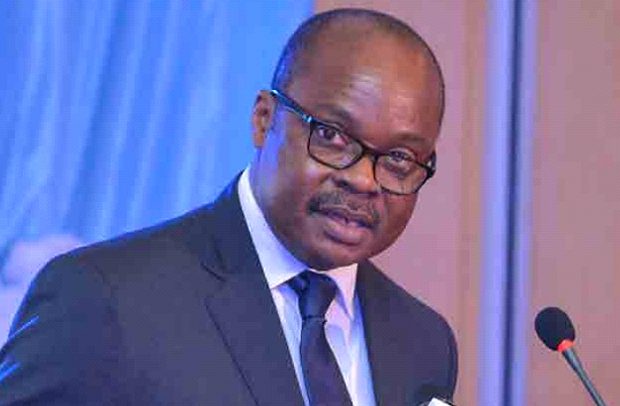Dr Ernest Addison
THE BANK of Ghana (BoG) has revoked the licenses of 347 insolvent microfinance firms, with effect from Friday, May 31, 2019.
In addition, licences of another 155 insolvent microfinance companies that have ceased operations have been revoked.
List Of Microcredit Firms Insolvent
1 Allied Wealth Money Lending Limited
2 Bennet Money Lending Limited
3 Bremco Money Lending Company Limited
4 Calmad Money Lending Company Limited
5 Catamount Finance Money Lending Limited
6 Citizens Money Lending Limited
7 Divine Announcement Money Lending
8 Fountain Money Lending Services Limited
9 GDFS Money Lending Limited
10 GFI Capital Management Money Lending Limited
11 Great Africa Money Lending Limited
12 Hatmag Money Lending Limited
13 Haubins Money Lending Limited
14 Index Money Lending Limited
15 KAF Investment Money Lending Limited
16 KBN Money Lending Limited
17 KYC Money Lending Limited
18 McOttley Money Lending Limited
19 N & J Money Lending Limited
20 Obrapa Money Lending Limited
21 One2One Money Lending Services Limited
22 Orbit Money Lending Co. Limited
23 Pitsea Ways Money Lenders Limited
24 P-Mag Investment Money Lending Services Limited
25 Sat Finance Money Lending Limited
26 Shammah Capital Money Lending Limited
27 SNJ Money Lending Limited
28 Uni-focus Money Lending Limited
29 Zeta Money Lending Limited
Microcredit Firms Insolvent and Ceased Operations
1 Boafo Yena Money Lending Limited
2 CFI Money Lending Limited
3 CIF Money Lending
4 First Assurance Money Lending Services Limited
5 Global Point Investment and Money Lending Services Limited
6 Intelligent Money Lending Company Limited
7 Kan Money Lending Company Limited
8 PD PAG Money Lending Limited
9 R.P.I.C. Money Lending Services Limited
10 TCP Money Lending Limited
Rationale For Closures
According to the bank in a statement, these actions were taken pursuant to section 123 (1) of the Banks and Specialised Deposit-Taking Institutions Act, 2016 (Act 930), which requires the Bank of Ghana to revoke the licence of a bank or Specialised Deposit-taking Institution (SDI) where the Bank of Ghana determines that the institution is insolvent or is likely to become insolvent within the next 60 days.
Consequently, the Bank of Ghana has appointed Eric Nipah as Receiver for the specified institutions in line with section 123 (2) of Act 930, the statement noted.
According to the statement, “the revocation of the licences of these institutions is to get rid of insolvent and
dormant institutions that have no reasonable prospects of rehabilitation and have denied depositors access to their deposits, thereby constituting a threat to the stability of the financial system.”
It added that “by the revocation of these licences, the Bank of Ghana seeks to protect the stability of the financial system and to protect affected depositors.”
To salvage depositors’ funds, it said, the Government of Ghana has made funds available to enable the Receiver pay depositors, after their claims are validated.
The statement noted that “in line with
the hierarchy of creditor claims set out under Act 930, other creditors of the failed institutions will be settled by the Receiver upon validation of their claims and to the extent that the Receiver is able to realise value from the remaining assets of these institutions.”
Background
Giving the background to the revocations of the licenses, the BoG said the emergence and rapid growth of microfinance operations in the late 2000s, led to the introduction by the Bank of Ghana of a licensing regime for the industry in 2011 after the promulgation of the Non-Bank Financial Institutions Act, 2008 (Act 774).
It said existing microfinance operators that had hitherto operated without a licence from the Bank of Ghana, were grandfathered into the new licensing regime introduced in 2011.
Subsequently, it said, these institutions were re-licensed under the now-repealed Banking Act of 2004 (Act 673).
According to the statement, a number of additional licences were issued on an annual basis until the end of 2015.
It noted that “by the end of 2015, about
484 microfinance companies had been licensed by the Bank of Ghana.”
The majority of licensed microfinance companies began to show signs of distress from 2014 onwards, as a result of severe undercapitalisation, high cost of operations largely from high and unsustainable interest rates offered to depositors, poor lending and investment practices leading to inordinate losses, diversion of customer deposits into private, unprofitable and speculative ventures, general non-compliance with prudential norms, poor corporate governance, weak internal controls, and fraud, among others,”it enumerated.
Over the years, it noted that the Bank of Ghana notified these institutions of deficiencies and vulnerabilities which had been identified through off-site reviews and onsite
examinations.
Unfortunately, it bemoaned, efforts by the Bank of Ghana to get the affected
institutions and their shareholders and directors to rectify these deficiencies yielded no results.
Consequently, the statement observed that the financial position of these institutions continued to deteriorate, leading to their insolvency with majority of them ceasing operations and closing their offices with depositors’ funds locked up.
“Even those that have not
closed their offices are unable to pay their depositors,” it said, adding that “this has placed a substantial amount of depositors’ funds at risk.”
“Given the risks that these institutions continue to pose to the entire financial system, and the need to protect depositors, the Bank of Ghana is sanitizing this sector through the orderly resolution of the failed institutions in accordance with sections 123 to 137 of Act 930,”
The Way Forward
Following the revocation of the licences of these institutions, a total number of 137 microfinance companies would continue to operate, it said, noting that going forward, the Bank of Ghana has put in place measures to ensure that the existing institutions remain safe and sound by complying with relevant prudential norms.
Among other things, it announced, the
Bank of Ghana is undertaking a comprehensive review of licensing and supervisory policies and directives; reviewing the minimum capital requirements for microfinance companies and encouraging possible consolidation through voluntary mergers and acquisitions.
BY Melvin Tarlue


